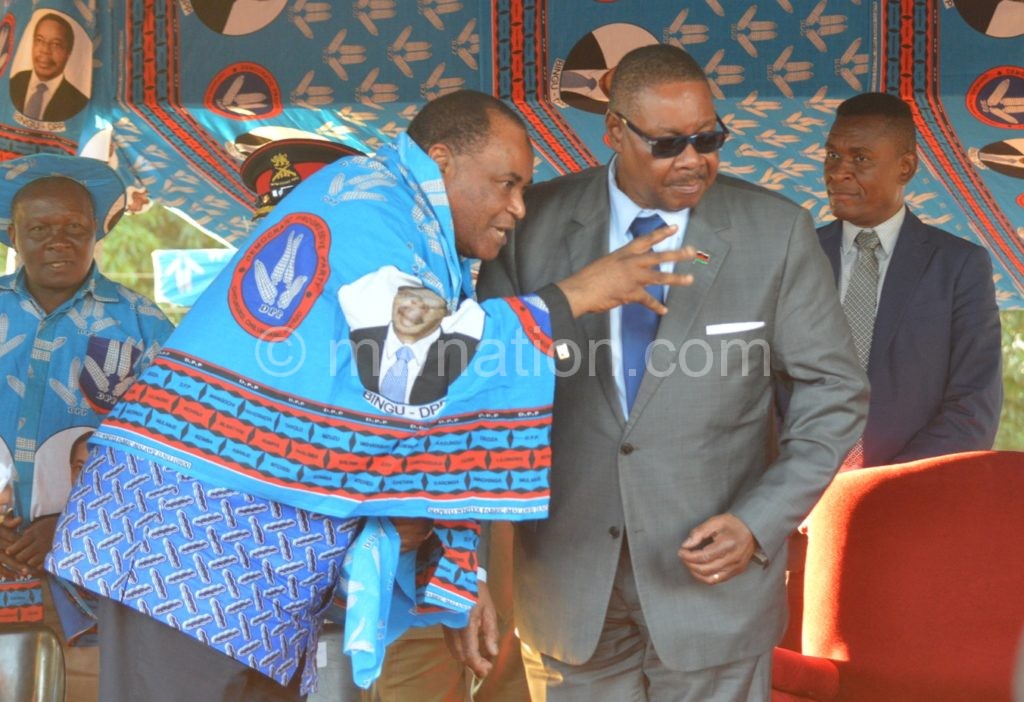US hails Uladi Mussa resignation
The United States (US) Government has described as encouraging the resignation of Uladi Mussa from his position as presidential adviser on parliamentary affairs, saying his presence in government was not consistent with Malawi Government’s stand on corruption.
Mussa resigned on August 8 2019 through a letter to the Chief Secretary in the Office of the President and Cabinet (OPC) days before he appeared before the High Court in Lilongwe yesterday to continue answering a corruption case in which the State is accusing him of misconduct on the issuance of Malawi citizenship to 50 foreigners.

However, the governing Democratic Progressive Party (DPP) says he remains its vice-president for the Central Region.
US Embassy public affairs officer Douglas Johnston, in a written response yesterday said the US Government was encouraged that Mussa has stepped down from his special advisory position.
He said: “It is the position of the United States Government that Mr. Mussa was involved in significant corruption while serving as Malawi’s minister of Home Affairs, and, therefore, his presence in government was no longer consistent with the current administration, which has publicly stated its determination to root out and eradicate corruption.”
On July 3 2019, US Secretary of State Michael Pompeo issued a designation against Mussa and his family—which was made under Section 7031(c) of the Department of State, Foreign Operations, and Related Programmes Act of 2019—due to what it termed ‘involvement in significant corruption’.
“The Secretary of State is publicly designating Mr. Uladi Basikolo Mussa, the current Malawian special adviser on parliamentary affairs and former Malawian minister of Home Affairs, due to his involvement in significant corruption,” read the statement from US Government.
Mussa is the first Malawian official under Section 7031(c) to be publicly designated by the US Government, according to Johnston who said when the Secretary of State obtains credible information that an official has been involved in significant corruption and/or a gross violation of human rights, the Secretary is required to designate or identify that official and his or her immediate family members under Section 7031(c) either publicly or privately.
On the way forward, Johnston said the US Embassy has worked closely with, and has strongly encouraged, the government to eradicate public corruption.
“We look forward to sustained action by the government, and all Malawians, to demand real accountability, including follow-up actions on Public Service Reforms commitments and full implementation of the Access to Information and Public Procurement laws.
“Accountability institutions like the Anti-Corruption Bureau [ACB] must be fully funded and fully staffed. We are confident that Malawians are eager to see the companies and individuals identified in the 87 case files, which the National Audit Office handed over to the ACB months ago, prosecuted to the full extent of the law,” he said.
In March 2017 the ACB arrested Mussa, then an interim president of Joyce Banda’s People’s Party (PP) for his suspected involvement in aiding foreign nationals to obtain Malawi passports while he served as minister of Home Affairs.
ACB director general Reyneck Matemba said in a telephone interview yesterday that Mussa appeared before the court in Lilongwe where ACB’s last witness was expected to be cross-examined by Mussa’s lawyers.
“Mussa’s lawyer was expected to cross examine our last witness. This did not take place because the defence lawyer was outside the country,” he said.
State House press secretary Mgeme Kalilani confirmed Mussa’s resignation, saying the former Cabinet minister submitted his resignation to the Chief Secretary on Friday, describing the reasons for his resignation as personal.
“The President has accepted the resignation. Personal reasons are personal and ought to be respected as such,” Kalilani responded.
On his part, DPP spokesperson Nicholas Dausi said Mussa’s resignation was from his government position not that of the party, saying he remains the party’s vice-president for the Centre.
He said: “As a party, he is still our vice-president [for the Centre]. Government is better placed to respond to anything to do with this resignation.”
Efforts to contact Mussa proved futile as he did not pick up his phone. When sent questions through whatsapp, he only responded by sending his head and shoulder picture in DPP regalia. However, media reports indicate that Mussa had conceded before going into the office, having authorised issuance of citizenships to some foreigners during his time as minister of Home Affairs but maintains all proper procedures were followed.





